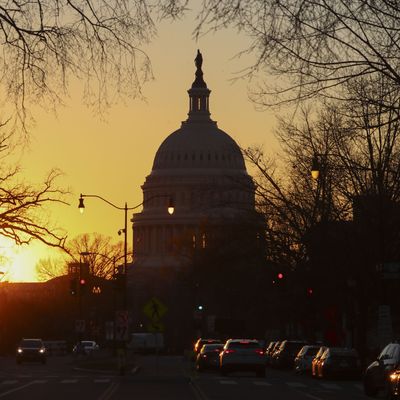
After a crisis over an immigration amendment that briefly threatened to screw up everything on Wednesday night, the Senate cleared a $1.7 trillion omnibus appropriations bill on Thursday that should enable a quick House rubber stamp, keeping the federal government functioning and letting members of Congress race to airports in an effort to beat an oncoming winter storm.
The omnibus was already on thin ice thanks to House Republican opposition when the Senate encountered its own sudden storm over a proposed amendment by Mike Lee cutting Department of Homeland Security spending if the Biden administration persisted in efforts to revoke a regulation (the so-called Remain in Mexico policy, or Title 42) that it and the Trump administration had used to deport migrants pending resolution of their claims for legal entry. Senate Democrats feared Lee’s amendment might pass and serve as a “poison pill” that would kill prospects of House passage of the omnibus.
Leaders of both parties had already decided that if the omnibus failed, they’d be forced to enact another stopgap spending measure that would keep the government functioning into 2023 at the cost of giving House Republicans an opportunity to renegotiate the entire spending package once they took over that chamber on January 3. And spending wasn’t the only thing at risk in these last-minute gyrations: The omnibus included a bipartisan measure reforming the Electoral Count Act of 1887, the ancient law whose ambiguities were exploited by the perpetrators of the January 6 insurrection.
Instead, Democrats came up with a rival immigration amendment (offered by Senator Kyrsten Sinema) that gave vulnerable Democrats “cover” against charges they were soft on border issues and that was grudgingly acceptable to House Democrats. The gambit worked; Lee’s amendment was defeated on a party-line vote and then the overall omnibus was enacted on a 68-29 vote, with three Republicans not voting. So 18 Senate Republicans brushed off threats by likely House Speaker Kevin McCarthy to kill their legislative priorities if they voted for the omnibus, which House Republicans are demagoguing on the usual “bloated domestic spending” lines.
McCarthy wasn’t the only conservative complaining about Senate Republican bipartisanship on this bill:
None of this bodes well for Republican unity in the 118th Congress, but at least it will begin with the federal government functioning, one big piece of business out of the way, and another January 6 far less likely.
More on Politics
- Trump Ambassador Picks: Who’s in His ‘Diplomatic Clown Car’
- What We Learned From the House Ethics Report on Matt Gaetz
- Everyone Biden Has Granted Presidential Pardons and Commutations






























